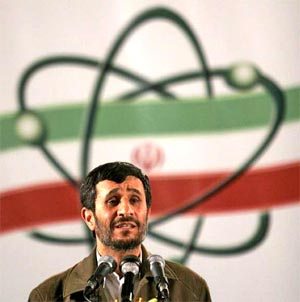Iranian President Mahmoud Ahmadinejad, facing new sanctions over his nation’s suspect nuclear program, arrived in Venezuela to start a five-day tour aimed at shoring up ties in Latin America.
The Iranian leader, who is traveling with several of his top ministers, was welcomed with military honors by Vice President Elias Jaua at the airport in Caracas, according to images broadcast on state television network VTV.
Ahmadinejad will meet fellow US foe and firebrand Venezuelan President Hugo Chavez during a four-nation trip that coincides with rising global alarm over Tehran’s reputed attempts to build an atomic weapon — a charge Tehran denies.
Chavez said earlier Sunday that he hoped the Iranian leader would “rest a bit tonight and then tomorrow we will work all day reviewing cooperation agreements.”
“We are not a threat to anyone. We have sovereign rights,” the Venezuelan leader said on his Sunday radio and television program, in an implicit jab at the United States’ stated concerns about Iran and Venezuela.
The remarks came in Chavez’s first such weekly broadcast since he was diagnosed with cancer last year, which he later said was successfully treated.
Ahmadinejad’s talks with Chavez will be followed Tuesday with a trip to Nicaragua to attend the inauguration of its recently re-elected leader Daniel Ortega. Stops in Cuba and Ecuador will round off the tour.
All four countries have frosty ties with the United States, and their leaders have in the past four years made numerous Tehran visits to build up diplomatic and business links while relations with Washington have worsened.
Just before leaving Iran, Ahmadinejad said that all the countries on his itinerary “resist the oppression” of the United States and share “an anti-colonialist view,” according to the Fars news agency.
“Latin America is a region that the oppressive regime (the United States) sees as its backyard where it can do as it likes. But today the people have awoken and are acting independently,” he said.
Ahmadinejad called Chavez “a hero in the struggle against the oppression”, said Ortega was leading a “revolution (that) is the same as the Iranian revolution”, and praised Ecuador’s ruling “revolutionaries who battle the (US) regime of domination”. He said he planned to sign deals in all four countries.
Officials in Ecuador have said Ahmadinejad will visit Quito on Thursday.
The United States on Friday urged Latin American countries against deepening their ties with Iran.
“As the regime feels increasing pressure, it is desperate for friends and flailing around in interesting places to find new friends,” State Department spokeswoman Victoria Nuland said when asked about Ahmadinejad’s trip.
Chavez countered that for Washington to say “no country should get close to Iran really is a laugh,” and said Ahmadinejad would be received “with great honor.”
Carlos Romero, a retired international relations professor at the Central University of Venezuela, said Ahmadinejad was “trying to find oxygen in Latin America,” while links with other states continue to spiral downwards.
Diplomats in Brussels said Friday that EU countries hope to reach a deal to slap an oil embargo on Iran by the end of January.
The Iranian president is accompanied on the Latin America trip by his foreign, trade, commerce and mines and energy ministers.
Ahmadinejad, who last came to Venezuela in November 2009, was scheduled to visit in September 2011 but the trip was postponed because of Chavez’s cancer diagnosis. The Venezuelan leader, who later declared himself free of the disease after undergoing treatment in Cuba, last visited Iran in October 2010.
Brazil, Latin America’s economic powerhouse, is notably absent from Ahmadinejad’s itinerary.
Lytton Guimaraes, an expert on Latin America at the University of Brasilia, said the omission indicated that President Dilma Rousseff was adopting a much cooler approach to Iran than that of her predecessor Luiz Inacio Lula da Silva.
“Brazil is not going to defend Iran, but nor will it attack it. It’s going to sit still,” Guimaraes told AFP.










